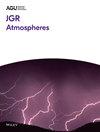Assimilation of Radar Reflectivity Data Using Parameterized Forward Operators for Improving Short-Term Forecasts of High-Impact Convection Events
Abstract
The assimilation of radar reflectivity requires an accurate and efficient forward operator that links the model state variables to radar observations. In this study, newly developed parameterized forward operators (PFO) for radar reflectivity with a new continuous melting model are implemented to assimilate observed radar data. To assess the impact of the novel parameterized reflectivity forward operators on convective storm analysis and forecasting, two distinct sets of cycled assimilation and forecast experiments are conducted. One set of experiments (ExpRFO) uses a conventional Rayleigh-scattering-approximation-based forward operator (RFO) with hydrometeor classification, while the other uses the PFO (ExpPFO_New) for radar reflectivity with a new continuous melting model. Eight high-impact severe convective weather events from the Hazardous Weather Testbed (HWT) 2019 Spring Experiments are selected for this study. The analysis and forecast results are first examined in detail for a classic tornadic supercell case on 24 May 2019, with the potential benefits provided by the PFO then evaluated for all eight cases. It is demonstrated that ExpPFO_New provides more robust results in terms of improving the short-term severe weather forecasts. Compared to ExpRFO, ExpPFO_New better reproduces all observed supercells in the analysis field, yields a more continuous and reasonable reflectivity distribution near the melting layer, and improves the strength of the cold pool compared to observations. Overall, ExpPFO_New, initialized from the more accurate analysis fields, produces better forecasts of reflectivity and hourly precipitation with smaller biases, especially at heavy precipitation thresholds.

 求助内容:
求助内容: 应助结果提醒方式:
应助结果提醒方式:


